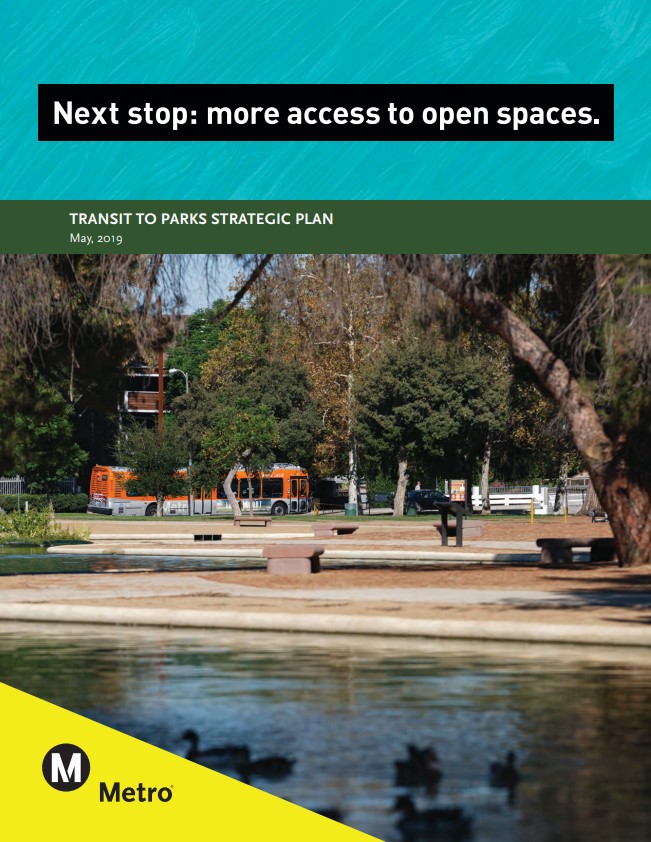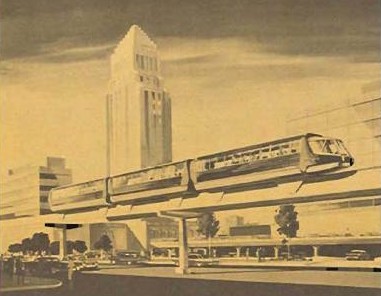Last week, the Metro board unanimously adopted the agency's proposed Transit to Parks Strategic Plan, as well as amending staff recommendations to give the plan a bit more momentum for implementation.
Metro's plan was developed in response to a 2016 motion by directors Hilda Solis, Sheila Kuehl, and John Fasana. The Transit to Parks plan details various initiatives that Metro and other agencies could implement to improve transit access to parks - from increased service, to bus service changes, to mapping, to improving first/last mile connections. The plan details four specific priority pilot proposals:
- Adding service on Metro Line 212 to better access Kenneth Hahn State Recreation Area
- Working with LADOT to develop Pacoima-Hansen Dam DASH service
- Connecting the Green Line to the beach via added service on Beach Cities Transit Line 109
- Partnering with Arcadia to connect the Gold Line with San Gabriel Mountains Chantry Flat
The Nature for All coalition has prioritized improved transit access to parks, beaches, mountains, and other open space. Coalition group representatives, most prominently from the Council of Mexican Federations (COFEM), attended Metro board and committee meetings to push the board to adopt the plan.
At last week's board meeting, Metro boardmember Mike Bonin called the plan "phenomenal," in that it works to "address fundamental problems" with Metro transit being too focused on commute trips and not the wider variety of trips people take. Bonin praised the plan's proposed pilots, while also urging improved bus service to Venice Beach.
The Metro board somewhat strengthened the plan adoption via a modifying motion put forth by boardmembers Sheila Kuehl, Hilda Solis, John Fasana, Kathryn Barger, and Eric Garcetti. That motion directs Metro to:
- Designate a Metro Transit to Parks liaison
- Create marketing/promotional materials for transit lines serving parks/open space - including a web-based access tool
- Outreach to Councils of Government (COGs), parks organizations, municipal bus operators, and other partner agencies to promote the Transit to Parks
- Contribute $1 million for grants for cities and nonprofits transit to parks programs - to be done in conjunction with the L.A. County Regional Park and Open Space District (RPOSD)
- Pursue funding for Transit to Parks activities, including providing grant writing assistance to eligible partner agencies and nonprofits
- Collaborate with L.A. County of Los Angeles Parks and Recreation Department to document data on park access
- Incorporate Transit to Parks in the NextGen Bus service reorganization
- Make recommendations on integrating transit-to-parks into 28 by 2028 and Measure M project planning
- Report back to the Metro Board every six months with status updates
Though the motion strengthens Metro's park access efforts, overall the plan remains largely aspirational, with little in the way of agency commitment to implementation. David Diaz, Executive Director of ActiveSGV (a Nature for All coalition organization), expressed that he is thankful for the plan and amending motion, but fears it may just sit on a shelf. Diaz pressed for Metro to assign a full-time staff person to Transit-to-Parks work; the motion falls short of that by just designating a liaison who would likely have multiple duties.
Diaz and the Nature for All coalition are also asking for Metro to put more money behind implementation. A million dollars is a small downpayment, insufficient to even cover Metro's fairly modest proposed pilots. Diaz wants Metro to allocate additional funds to match anticipated county RPOSD funding.
Diaz reports that the coalition will be closely monitoring Metro's transit-to-parks efforts via six-month status reports, and the NextGen bus service roll-out.
Improving transit access to parks will not come easy. At a time when construction costs are increasing and Metro is looking to accelerate highway and rail construction, transit funding is tight. Even when funding is available, whiter more well-off beach and hillside communities resist transit improvements that are seen as bringing lower-income people of color. For decades beach communities have blocked direct RTD and Metro bus service. Just last year, under the banner of "Keep Altadena Beautiful," residents pushed to end San Gabriel Mountain pilot shuttle service.
Adopting the Transit to Parks Stratagic Plan is, in Diaz's words, "one step in the right direction" toward making sure "the public - everyone - has access to public lands."







